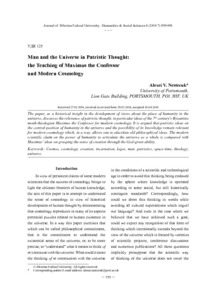Man and the Universe in Patristic Thought: the Teaching of Maximus the Confessor and Modern Cosmology
Скачать файл:
URI (для ссылок/цитирований):
https://elib.sfu-kras.ru/handle/2311/10393Автор:
Nesteruk, Alexei V.
Нестерук, А.В.
Дата:
2014-06Аннотация:
The paper, as a historical insight in the development of views about the place of humanity in the
universe, discusses the relevance of patristic thought, in particular ideas of the 7th century’s Byzantine
monk-theologian Maximus the Confessor for modern cosmology. It is argued that patristic ideas on
the central position of humanity in the universe and the possibility of its knowledge remain relevant
for modern cosmology which, in a way, allows one to elucidate old philosophical ideas. The modern
scientific claim on the power of humanity to articulate the universe as a whole is compared with
Maximus’ ideas on grasping the sense of creation through the God-given ability В статье, как историческом свидетельстве о развитии взглядов о месте человека во вселенной,
обсуждается связь идей греческой патристики, в частности византийского монаха-богослова
Максима Исповедника, с современной космологией. Показывается, что представления
патристики о центральном положении человека в творении и сама возможность его
познания, сохраняют свою актуальность в контексте современной космологии, которая
«по сути» позволяет прояснить взгляды античных мыслителей. Уверенность современной
космологии в том, что человек в силах артикулировать вселенную в целом, используя научные
методы, анализируется в контексте идей Максима Исповедника о Богом данной способности
постигать творение

